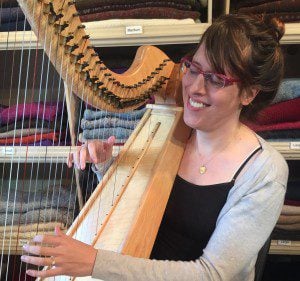I’ve talked before about the importance of including trans people in the Christian conversation. On Sexual Authenticity, I hosted a guest post by, Edie, a trans theologian. Today, I’m interviewing Aoife Assumpta Hart, a Catholic transwoman. This interview has been abridged and slightly edited with Aoife’s approval. The full text is available on her blog.
Hi Melinda! Thank you so much for this opportunity to discuss, in friendship and openness, my experience as a transwoman. A frustrating aspect of being a Catholic transwoman is that, invariably, we are spoken for and never with
Just recently I’ve seen several well-meaning clergymen, with massive online platforms, proffering priestly pathologies on the origins of transsexuality. Unfortunately, in turning our lives into debatable symptoms, we who are spoken for can resemble rationality-bereft ghouls.
Our bodies have been compared to the Satanic iconography of Baphomet. Gender dysphoria has been contrasted with a five year old niece playing doggie. These comparisons are insulting, upsetting, and there merest chat with a trans person might enable our priests to offer evaluations that are more charitable.
Can you describe a little of your experience — what does being a trans woman mean for you? How has transition affected your life?
I am a transsexual. Meaning — I was born male; suffered tremendously from terrifying sex dysmorphia; and obtained expert medical therapies and treatments that enable me to socially live as a transwoman. I have much in common with my female friends, and much that I don’t.
Informed by the Catechism of the Catholic Church, I recognize that sex is a material fact. I was not “assigned” male at birth. I was born male. And however much grief I have for that, or whatever medical modifications I have enacted, I cannot really change that.
Unlike trans activists, I don’t believe transition is a simple declaration of “always was” which renders the birth sex (male) wrong; that the person has always been female. Transition is a complicated process moving from birth sex into living as a trans person. It involves expert medical therapies as well as a difficult negotiation with social re-embodiment.
Transition saved my life; it was the only treatment that, after decades of inescapable self-horror, finally allowed me to feel as if I inhabited a body in which I could belong.
My life pre-transition was like a burning labyrinth with no centre and no exit. Transition was like like falling in love for the first time: falling in love with myself. Rage dissipated, unbearable uncertainties and colossal self-hate dissipated. In its place came clarity, patience, awareness, compassion. My heart opened: I asked myself to forgive myself. And I learned how to love all over again. This was a necessary step in my path to returning to the Church. When I existed as a fraught incongruency, how could I love myself? And how can one love God but not love one’s very own self?
What brought you back to the Church? And what kind of a welcome did you receive?
In most direct terms . . . what brought me back to the church was our Holy Mother and St. Thérèse, whose intercessions preserved my faith in the darkest corners. Practically speaking, I was inspired by my friend Tara Hewitt, a transwoman and recent convert to the faith who has received much warmth and fellowship in her diocese.
Just prior to my transition, on Feb 11 2011, I attempted to hang myself in my bathroom. Suspended by a judo-belt tied to the shower curtain rod, I hung suspended, in a successful suicide attempt, for at least thirty seconds. I was incapacitated, already subsumed in the roar of death. For some reason – the power of God or cheap Vancouver apartment fixtures – the rod broke and I fell headfirst into the bathtub, shaking violently and blood pouring from a wound where my head hit the porcelain tiles.
I knew I needed help, and for the first time in my life I had to confess the secret eating me alive: I really … needed … to live as a woman. I could not occupy my body anymore: the insoluble conflict had to end.
Indeed, it was a Jesuit friend at a university who listened to me when I said “I’m trans and I need help”. His patient compassion saved my soul. He recommended two things: a book by Nouwen, and an expert psychologist. Both of these suggestions changed my life.
My Jesuit friend did not cavil over rubrics or treat me as an abstraction to diagnose: he saw a profoundly hurt soul in need of love and healing.
I didn’t transition for so long because I assumed the church viewed trans people with an insipid mix of pity and detestation, and that I could never return home. Despite my intervening years of agnosticism I still read frequently on church teaching. Somehow imagining myself as a transwoman I was able to worship God with the loving expression that was reduced to a dying ember within. I wanted to witness to God in the fullness of my body, not just the interiority of my anguish. Transition enabled me to do this.
You mention on your blog that you’re working on a book that deals with trans people and the Theology of the Body. I’m fascinated to know what your thoughts are on this.
Yes, this will be my second book, which is currently in progress!
I reckon my single biggest frustration is the utter dearth of compassionate and nuanced examinations as to what transsexual embodiment entails as a practicing Catholic, and what is the liturgical and ecclesiastical status of a transsexual person? I hope my book will help other transwoman, yearning to connect to Christ through His church, that they may believe in the possibility of living their Catholic faith.
The truth is we are in a limbo as far as church recognition. We hear scraps of pronouncements from the Pontiff: a meeting with a Spanish transman, whom he allegedly hugged and called “a son of the church”. However, in another instance the Holy Father compared “gender identity theory” (which I don’t support, but that’s another topic) to atomic weapons. It’s assumed we want to “change” church teaching. Yet we’re in an era where trans people like myself are returning to the church; but we really don’t have any official or catechetical statements on the place of trans people in the Catholic church, our access to the sacraments, and our canonical status for that matter. This also contributes to the unfortunate circulation of misinformation.
To me, The Theology of the Body is the most comprehensive effort to enact a Catholic epistemology of sexed embodiment, based upon the realities of human sex dimorphism, and the ethical mandates of the Christian faith to respect the ethics of sexual differentiation. So where do transsexual people fit in such a schema? It is my contention that, with discretion, prayer, and honesty, that transsexuality is not incompatible with the practice of the Catholic faith.
What does you life look like as a Catholic transwoman? Does being trans influence your faith, and if so in what ways?
First and foremost, utterly joyful. I am so grateful to be back and living my faith as a transwoman! I cannot emphasize this enough. I would also emphasize that I’ve been treated exceedingly well by my Parish, and the diocese here in Vancouver (where we have an excellent policy, in fact, on trans kids in the Catholic school system).
I grew up Catholic, so I was already familiar with the theology and practice of the faith. But that time of my faith was a void or aporia. A black hole. There was an agonizing gap between my physical life as sexed male, the gender rules expected of that, and the incredibly intense sexual dysmorphia that my soul and body were badly misaligned. I could write extensively about that adolescent suffering amidst the symbols of Catholic childhood as strictly gender demarcated. The first communion dress I never wore. The schoolgirl in white blouse and plaid skirt who never was. The possible postulant with a thwarted vocation. My consciousness was like a maze of collapsing mirrors: I couldn’t know who I was, because who I was couldn’t be. And where can love and faith dwell in such a place? I’m fond of quoting St Augustine’s Confessions: “But where was I when I looked for you? You were there before my eyes, but I had deserted even my own self. I could not find myself, much less find you.” (Bk. V, 2, p. 92). Like a murder mystery in which my very soul was both destroyer and victim: and insoluble conflict in my own skin. I could not find myself, and therefore I could not find You.
But now I’m back in faith! Maybe it’s because I pass well (I don’t readily disclose I’m trans, but I don’t hide it either), and maybe it’s because the love of Our Mother motivates me . . . I’ve made friends and found a place in my parish. When I had SRS, it was my female friends who prayed for me, sent cards, and so forth. Belonging to a community of faith is so enriching!
Thus, other than a few Twitter Catholic puritans shouting “MAN” at me online, I’ve been generally welcome in all church functions I’ve participated in.
But are transsexuals welcome in the church? This question haunts me every time my knee scrapes the carpet in scared genuflection. Every time someone stares at me for a few minutes at Mass.
Am I wanted? Is this the day I get taken aside for a private word … “We like you, Aoife, but there’s been some discussion . . .”
It would break my heart.
You talk about sex reassignment as a “therapeutic necessity.” What does that mean?
Sex reassignment surgery is a misnomer: we can’t really change sexes, but we can legally reassign them. What I can report is the most profoundly conversional experience of being changed, in form and substance, by the power of faith as well as medical therapy.
I suffered with the terrible self-indictment that, for lack of a better phrase, I was trapped in a body inhospitable and alien to me and the world. Hormone therapy eased that suffering; social transition enabled me to shed the unwanted; and SRS liberated me from an insoluble war with my own skin. It was a therapeutic necessity, because at this time in medical history this treatment is, as documented, effective and life-saving for transsexuals like me.
In the trans community, some say SRS is just like a nose job – there should be no psychiatric requirement, available on demand. Others see SRS as a dire invasion of their physical selves: they claim to be women who happen to have penises. I don’t agree with either position: sex dysmorphia is a hellish condition, requiring expert care, with SRS undertaken only with full consent and thorough advising.
Is there anything in particular that other Catholics have done or said that you’ve found really helpful?
Please: this above all — We must not fellow prioritize “good theology” over treating others compassionately. This isn’t about liturgical propriety. This is about being a welcoming place for the marginalized in need of God’s healing Love.
If you think practical human friendliness can’t open a wounded heart to Christ in dire times, then you truly have no sense of the Gospels. Being not just the sign of peace, but the embodied practice of peacefulness.
Overall, it’s been a lonely quandary: I’m attacked by certain Catholics (invariably white men online) because I’m technically LGBTXYZ… And I’m regularly attacked by the LGBTXYZ because I’m Catholic and I support Catholic teachings on sexual ethics. Without the love of my Catholic friends, especially the support of Catholic women, my journey would be so much more difficult.
I offer prayers for my friends each night, especially the women who noticed I was at Morning Mass alone and invited me to coffee; asked me to join their bible studies; invited me to dinner in their homes. These are friends who do not pry, nor do I pry into their lives. We share our hurts and triumphs, support each other in the vacillations of our vocations. We offer unconditional validation to each other in the name of Mary, Mother of God.
The most emphatic invitation I can make to all Catholics is to talk with us. Do not assume all transwomen think the same thing, or are pushing the same agenda. And by chatting with us you might be surprised! We’re not atomic bombs set to radiate the entirety of the magisterium from the inside.
I receive many messages from closeted trans people afraid transition will cost them – along with their job and family (as was my case) – their faith. This is a terrible and unfair circumstance for people struggling with a mental illness like gender dysphoria.
We are Catholics as well – sinners, strugglers, survivors. I appraised my life situation after my suicide attempt and knew that transition would enable me to attain a peace I had never known. And in this peace I found prayer … and in prayer I knew love. Thank God.
Photo credit: Aoife Assumpta Hart
Note: Before commenting, you may want to familiarize yourself with my comment policy. I’m usually pretty lenient about enforcing it, but I won’t be here. Disrespectful or uncharitable comments will be deleted.













